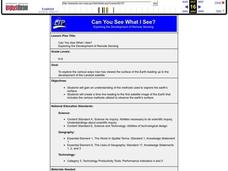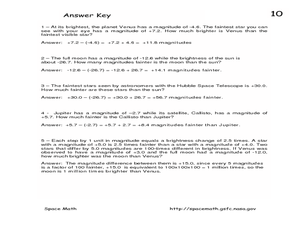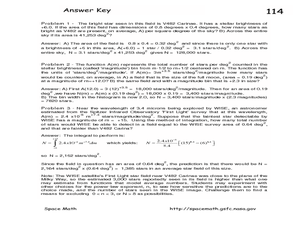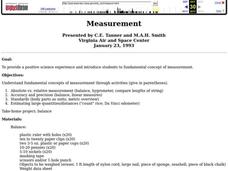Curated OER
Cross Sections and Collision Times
High schoolers solve five problems including finding the cross sectional area of two bodies, determining the swept out volume of a moving body, finding the average particle volume of a body and determining the collision time for a body.
Chicago Botanic Garden
Recent Weather Patterns
Decide whether weather is changing! A two-part activity first challenges classes to review the differences between weather and climate. Once finished, individuals then analyze historical data to determine if climate change is happening...
Chicago Botanic Garden
Historical Climate Cycles
Scientists use ice core samples to obtain temperatures of the earth from 400,000 years ago! The third of five lessons instructs pupils to interpret historical climate data to see changes over time. In part I, participants interpret...
Curated OER
Detective Digis and the Computer Caper
Mathematicians participate in an hands-on activity to investigate the binary number system and write messages in binary code and have classmates decipher the messages. A said video on the topic does not seem to be available, but the...
Curated OER
Can You See What I See?
Learners gain an understanding of the methods used to explore the earth's surface. Students create a time line leading to the first satellite image of the Earth that includes the various methods utilized to observe the earth's surface.
Curated OER
Air Pressure is Powerful
Students make a barometer and write a paragraph describing how they did it.
Curated OER
Interplanetary Travel Guide
In groups of six, middle school space scientists create an imaginative travel brochure for attracting visitors to the planet Mars. Information must include surface features and atmospheric conditions. Although time-consuming, this is a...
Curated OER
Activity on United States Moon Landing: Apollo 11
Students use the World Wide Web to access additional information needed to complete a set of questions. They demonstrate an understanding of latitude and longitude by interpreting a lunar map.
Curated OER
Make a Comet Model and Eat It!
Students construct a comet model based on procedure provided. In this space science lesson, students compare the physical properties of comets to the models they made. They record their observations and share them with the class.
Curated OER
The Stellar Magnitude Scale
In this stellar magnitude scale worksheet, students use a scale showing the magnitude of objects in the sky to answer 5 questions about the brightness of the moon, the planets and stars.
Curated OER
Having a Hot Time on Mars!
In this cosmic radiation on Mars learning exercise, students study a radiation map of Mars taken by the MARIE instrument on the Odyssey spacecraft. Students answer 4 questions using the radiation map and they answer questions about the...
Curated OER
Power Functions: A Question of Magnitude
In this power functions worksheet, students read about determining the brightness of stars using a magnitude scale. Students solve 4 problems including finding the magnitude differences of stars and determining equivalent magnitudes.
Curated OER
Grandpa's Social Security
Students examine social security and how the process works at different ages.In this retirement lesson students determine how long a retired person has to live to get the same benefits at different ages.
Curated OER
Cloudy Days are for Reading and Writing
Students research weather proverbs and determine the scientific validity of 3 weather proverbs. They write an essay presenting their reasoning. They interview elderly people to graph the most frequently heard proverbs and theorize...
Curated OER
Impact Craters: Holes in the Ground!
Students simulate crater formation through a lab activity. In this space science lesson plan, students calculate how much energy is transferred during meteorite impact. They identify different factors affecting the size and depth of...
Curated OER
Exploring Meteorite Mysteries: Building Blocks of Planets
Students simulate the formation of chondrites and asteroids. In this astronomy lesson, students demonstrate accretion using balloons and static electricity. They compare and contrast their models to the actual process of chondrites and...
Curated OER
Volcanoes are a Blast-Working with Simple Equations
For this projectile motion worksheet, students solve 3 problems and an inquiry problem using three equations that describe projectile motion. One equation is for the maximum velocity to reach a height, H, the other is the maximum...
Curated OER
Sunspots
In this sunspots worksheet, students use the given size of a sunspot and find the total number of Earth's it would take to equal the sunspot size. Students answer 3 questions about the sunspots and are given an extra credit problem with...
Curated OER
Exploring Power-Law Functions Using WISE Data!
In this power-law functions worksheet, students solve 3 problems using data from the Wide-field Infrared Survey Experiment in the constellation Carina. Students use a photograph to determine the number of stars as bright as the brightest...
Curated OER
Ultra-Efficient Engine Technology Kid's Scavenger Hunt
In this engine technology worksheet, students use a referenced website to complete a scavenger hunt, answering a set of 17 questions.
Curated OER
How Many Days Are in a Year?
Students create a calendar for an imaginary planet. For this earth science lesson, students analyze the errors on the different calendars used on Earth. They present their work in class.
Curated OER
Measurement
Students experience a positive science experiment and study fundamental concepts of measurement.
Curated OER
Impact Craters
Young scholars investigate the factors affecting the size of a crater. In this space science lesson, students collect data from the activity and graph them. They explain how velocity of impact relate to crater size.
Curated OER
Monster Sunspots!
In this sunspots worksheet, students read about the large sunspots observed for thousands of years and their indication of solar storms. Students use given images to find the scales and physical sizes of the 3 sunspots shown.























